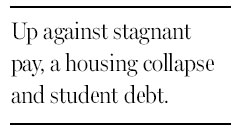Young Americans lagging behind parents in building wealth
Updated: 2013-04-07 07:44
By Annie Lowrey(The New York Times)
|
|||||||

WASHINGTON - Pearl Brady has a stable job with good benefits and holds two degrees, a bachelor's and a master's. But, she has no savings.
"I'm in that extremely nervous category," said Ms. Brady, 28, a New Yorker who works for a union. "I know how much money I'm going to be making for the near term. I hope in my 30s and 40s to be able to save, but I have no idea how. It's scary."
Ms. Brady has plenty of company. A new study from the Urban Institute, a nonprofit Washington research institution, finds that Ms. Brady and her American peers up to roughly age 40 have accrued less wealth than their parents did at the same age, even as the average wealth of Americans has doubled over the last quarter-century.
"In this country, the expectation is that every generation does better than the previous generation," said Caroline Ratcliffe, an author of the study. "This is no longer the case." The authors said the situation facing young Americans might be unprecedented.
A broad range of economic factors has conspired to suppress wealth-building for younger American workers. They are facing stagnant pay as well as a housing collapse and soaring student loan debt.
Ms. Brady earns about $1,800 a month in take-home pay. But she paid for her undergraduate and graduate education in part with loans, which cost her about $400 a month. She also pays about $500 a month in credit card debt. After food, rent and living expenses, there is little left over.
"Realistically, my income will go up, but not at a rate that's going to match my expenses," Ms. Brady said. "I feel like every step forward I take, it's three steps back."
Chuck Ross, 31, has a master's in economics and at one point built up $12,000 in savings from investing. But he lives in Wichita, Kansas, where jobs in his field are few. He works at a chain restaurant and is struggling with $40,000 in student loans.
Strong and sustained job and wage growth would cure many of the ills facing younger workers, experts said. But their delayed or diminished wealth accumulation might still have a lasting impact on their finances.
The Urban Institute study is one of many to show something of a perfect storm of economic trends battering younger workers. One is the collapse of the housing bubble. Many young adults are locked out of the market because credit standards are tougher.
A second major trend is the rise of student loan debt, which has continued to grow through the recession.
"I just don't think about it," said Mr. Ross, of his student loans. "I push the thoughts out of my mind, and when I do think about it now and then I kind of just think that maybe I'll have to work indefinitely."
Finally, younger workers have faced a brutal job market in the last half-decade. The unemployment rate is 7.8 percent for workers ages 25 to 34 and 5.5 percent for those ages 45 to 54.
For now, millions of younger workers are on their own. "We both had vanilla lower-middle-to-middle-class lifestyles," said Christopher Greer, 32, who works in astronomy and lives in Arizona, referring to himself and his girlfriend. "I'm not sure how that's going to play out for us."
The New York Times
(China Daily 04/07/2013 page10)